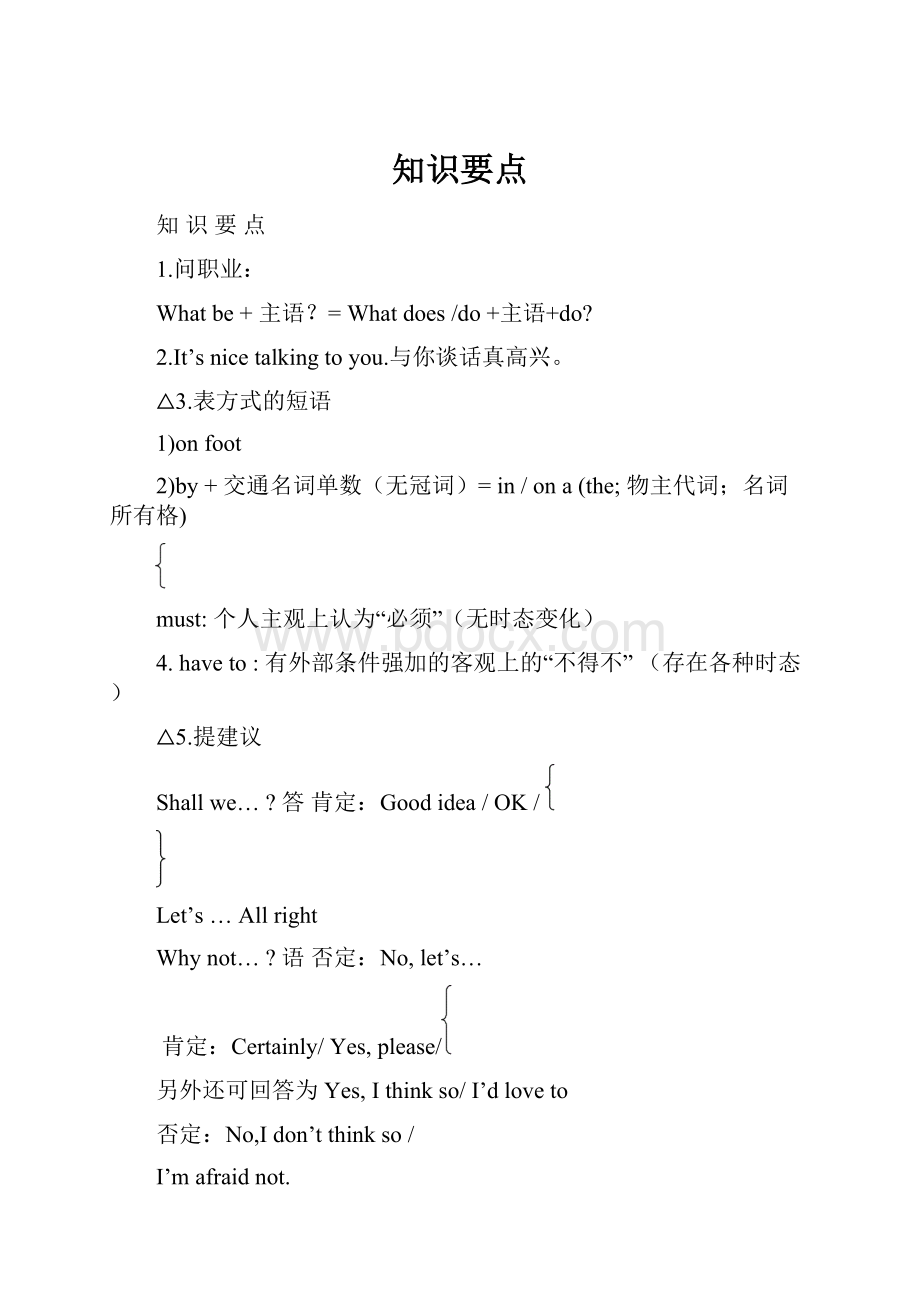知识要点.docx
《知识要点.docx》由会员分享,可在线阅读,更多相关《知识要点.docx(14页珍藏版)》请在冰豆网上搜索。

知识要点
知识要点
1.问职业:
Whatbe+主语?
=Whatdoes/do+主语+do?
2.It’snicetalkingtoyou.与你谈话真高兴。
△3.表方式的短语
1)onfoot
2)by+交通名词单数(无冠词)=in/ona(the;物主代词;名词所有格)
must:
个人主观上认为“必须”(无时态变化)
4.haveto:
有外部条件强加的客观上的“不得不”(存在各种时态)
△5.提建议
Shallwe…?
答肯定:
Goodidea/OK/
Let’s…Allright
Whynot…?
语否定:
No,let’s…
肯定:
Certainly/Yes,please/
另外还可回答为Yes,Ithinkso/I’dloveto
否定:
No,Idon’tthinkso/
I’mafraidnot.
puton强调“穿”的动作:
穿上,戴上后接
△6..wear是puton之后的结果:
穿着“衣服”
=bein名词
dresssb:
给某人穿衣
eg.1)You’dbetter____moreclotheswhenyougoout.It’scoldoutside.
A.wearB.dressC.putonD.takeoff
2)Theboycan________himselfnow.
A.wearB.dressC.putonD.takeoff
3)Tomiswearingaredshirttoday.
A.isonB.isinC.isputtingon
△7.在具体的某楼前用on
eg.Helivesonthefifteenthfloor.
△8.Howdoyoulike…?
你觉得……怎么样?
=Whatdoyouthinkof…?
9.alittle=abit
但注意:
1)alittle+名词=abitof+名词)
eg.Thereisalittle(abitof)waterintheglass.
2)notalittle=verynotabit=notatall
△
10.quite:
quitea(an)+形+名
very:
avery+形+名
eg.Thisisaveryinterestingbook.=Thisisquiteaninterestingbook.
11.inahurry:
匆忙地
eg.1)Heisinahurryallday.
2)Shewenttoschoolinahurry.
另外:
hurryto…=goto…inahurry
12.marrysb=bemarriedtosb.与某人结婚
getmarried=bemarried已婚;结婚
(但getmarried是“短命”动词,要指“结婚多久”应用bemarried)
△
13.leavesth+地点:
把某物忘在某地
forgetsth:
忘记某事
eg.1)He______thedriver’slicenseyesterday.
2)I____myumbrellainthetrainjustnow.
△14.感叹句
1)What(a,an)+形+名(+主+谓)!
(注:
但名词为不可数、复数时,则不用a/an)
2)How+形/副(+主+谓)!
eg.1)________badweather!
2)______hardtheyareworking!
3)______goodgirlsheis!
4)_____beautifulflowerstheyare!
“雨大,雪大”heavy---heavily/hard
△15.“风大”strong---strongly
“太阳大”bright---brightly
注意以上词的形、副区别
eg.1)Therewasa__________rainyesterday.
2)Itblew________lastnight.
3)Thesunisshining___________.
4)Look!
It’sraining__________.
5)Whata___________wind!
howlong:
多长时间(问时间段)
△16.howoften:
多久一次(问频率)
eg.1)Ididn’tgotothecinema._____Iwenttothelibraryyesterday.
2)Wewouldliketostayatschool_______goingtothecinematoday.
△18.so句型
so+be(助、情)+主语:
“也如此”
so+主语+be(助、情):
“的确如此”
注意:
表示“也不如此”用neither/nor
△19.指路与问路
问路
1)Excuseme.Couldyoutellme…
howIcangetto….
howtogetto…
thewayto…
2)Excuseme.Whichisthewayto…
指路
1)Godown/up/alongthisroadand…
go还可替换为walk
2)Godown/up/alongtotheend.
3)Goonuntilyoureachtheend.
4)Takethe…turningontheleft.
=Turnleftatthe…turning.
5)Goacrossthebridge
△20.
△21.
eg.1)__________heisastudent.
2)He___________astudent.
△22.
类似结构
△23.到达
但当后不接地点时,只能用arrive
eg.1)Sheis_____________girl.
△
△
30.toone’ssurprise使某人吃惊的是……
类似结构:
toone’sjoy使某人高兴的是……
31.agreewith:
同意某人(或某人所说的)
agreeto:
同意某事
32.beon…team:
参加……队;是……的队员
eg.Heisonthecitybasketballteam.他是市篮球队队员。
△33.teachsb+科目(当sb是人称代词时应用宾格)
△34.the100-metrerace100米赛跑
100-metre作定语,修饰race,注意metre用单数。
类似结构:
①atwo-thousand-wordletter一封两千字的信
②an18-year-oldgirl一位18岁的女孩
另外有时还可用所有格形式来表达:
100-metrerace=100metres’race
two-monthholiday=twomonths’holiday
但当前面有a/an;物主代词;所有格时。
则只能用复合形容词来表示:
eg.WhatdidtheheadmastersayaboutJim’s______.
A.twomonthsholidayB.Twomonths’holiday
C.two-monthholidayD.twomoth’sholiday
35.problem与question
question:
指人们主观上产生而提出等待回答的问题。
常与ask,answer连用
problem:
指客观上存在等待解决的问题着重指“难题”。
常与solve,workout连用
borrow:
借进borrow…from从…借
△36.lend:
借出lendsbsth=lendsthtosb
把某物借给某人
keep:
保存;借(多久)(与时间段连用)
△37.It’s+adj+of/forsbtodosth.
当形容词用于修饰人时,介词用of.常见的此类形容词有:
kind;good;clever;careful;polite;right;wrong.其余情况用for.
△
38.more:
另外的;额外的(放在数量词之后)
another:
再一(另一…)(放在数量词之前)
usedto+动原:
过去常常做…
△39.beusedto+动原:
被用于做…
be/getusedtosth:
习惯于某事
other:
放在被修饰词之前
△40.else:
放在被修饰词之后,一般修饰不定代词和疑问词
1)otherstudents别的学生
2)anybodyelse.其它任何人
whatelse.别的什么
△41.so+形/副
such+形+名
但注意:
1)so+形+a/an+单名=sucha/an+形+单名
2)so(many/much/few/little)+名
3)so…that;such…that如此…以致…
have/hasbeento:
曾经去过…
△42.have/hasgoneto:
已经去了…
have/hasbeenin:
已在…(多久)
注意:
1)后接地点副词here,there,home时应省介词
2)与时间段连用只用have/hasbeenin
△43.“短命”动词“长命”动词
buy—have;borrow—keep;die—bedead;leave—beaway(from);comeback—beback;fallasleep—beasleep;open—beopen;
catchacold—haveacold;go/getout—beout;
arrive(reach/getto/cometo)+地点—bein+地点;join—bein+集体(或be+成员);
turnon—beon;turnoff—beoff;getaletterfrom—havealetterfrom.
end/finish—beover;getup—beup;
44.except:
除…以外(不包括除去的部分)
besides:
除了…,还有…(包括除去的部分)
1)WegotoschooleverydayexceptSunday.
该句意味着:
WegotoschoolfromMondaytoSaturday.
2)WeallwenttotheparkbesidesLiLei.
该句意味着:
Wewenttothepark,andLiLeiwent,too.
take:
Ittakesbsometimetodosth.
△45.
主语
pay(money)forsth是人
buysthfor+money
cost:
sthcostsb+money主语是物
sometime:
某时(与将来时连用)
△46sometimes:
有时(一般现在时
sometime:
一些时候(表时间段)
sometimes:
几次
47.betodo:
表将来
ThereistobeasportsmeetingnextSaturday.
△48.计量:
表事物的“长、宽、高、深、远、厚”用“long;wide;high/tall;deep;away;thick.
△49.population:
不可数名词。
指人口的多少用“large/big或small”;询问人口的多少用what.
另外注意:
表示“有…人口”用haveapopulationof.
eg.makeroomfor:
为…腾出空间
51.seem的用法:
1)seem+adj=seemtobe+adj
2)seemtodo
3)Itseems+that从句
1)Hetalkedasifheknewallaboutit.
他说话的口气好象已经全知道了此事。
2)Heopenedhismouthasiftosaysomething.他开口似乎要说什么。
interested;excited;surprised主语是人。
指某
△53.人对…感兴趣/感到兴奋/感到惊奇(只作表语)
interesting;excited;surprising主语是物。
指
某物有趣/令人兴奋/使人惊奇(可作定、表语)
1)作情态动词,用于否、疑句
△54.need2)作实义动词needtodo(表主动)
needdoing(表被动)
1)Youneedn’tgohomenow.
2)Thebikeneedsmending.
3)Ineedtogohomenow.
△55.alive:
活着的;在世的(常作后置定语)
living:
活着的;没死的(常作前置定语)
△56.否定前移的动词:
think,believe,expect,suppose.
1)Ididn’texpecttheirteamwouldwin.
我希望他们的对不会赢。
2)Idon’tthinkhewillcometomorrow.
我认为明天他不会来。
lookat:
(有意识地)看…
△57.see:
(lookat之后的结果)看见
read:
看(书、报等)
watch:
看(电视、比赛等)
另外注意:
1)seeafilm看电影2)seeadoctor看医生
△58.listento:
(有意识地)听…
hear:
(listento之后的结果)听见
lookfor:
(强调“找”的动作)寻找
△59.find:
(lookfor之后的结果)找到
findout:
(经过努力、周折)查出,找出(真相等)
△60.hope:
(可能实现的)愿望
wish:
(难以实现的)愿望
另外注意:
1)wishtodosth=hopetodosth
2)wishsbtodosth()
hopesbtodosth(╳)
①enough:
放在形、副之后.goodenough
△61.②修饰不定代词(something,anything,nothing)的词应后置。
③else修饰不定代词和疑问词应后置)
1)Ihavesomethingimportanttotellyou.
2)Hedidn’trunfastenoughtocatchupwithTom.
hadbetter+动原否定hadbetternot+动原
△
62Will/Wouldyouplease+动原?
Will/Wouldyoupleasenot+动原?
Willyoupleasenottalkinclass?
△63.What’stheweatherlike…?
…的天气
=How’stheweather…?
怎么样?
△64.find+宾+形:
觉得…怎么样
findit+形+todo:
觉得做…怎么样
类似用法还有make,think等
1)Ifindthequestion___________(容易).
2)IthinkitimportanttolearnEnglis.
△65.anumberof+复名:
许多,一些(作主为复)
thenumberof:
…的数目/号码(作主为三单)
too:
句末用于肯定句
△66.also:
句中“也”
either:
否定句末“也不”
△67.already,just:
肯助后
yet:
否、疑末
1)Ihavealreadyhadlunch.
2)Ihaven’thadlunchyet.
68.live:
(长时间的)居住
stay:
(短时间的)居住
eg.HelivesinChangsha,buthe’sgoingtostayinShanghaiforafewdays.